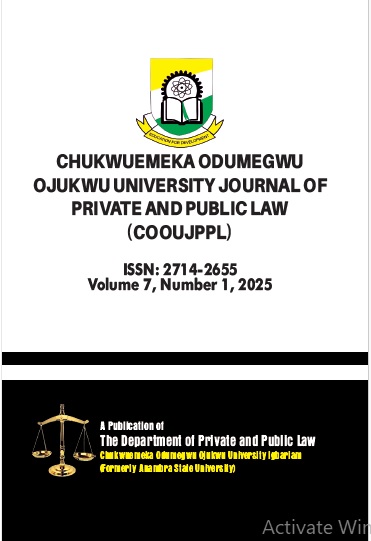A CRITICAL ANALYSIS OF THE LEGAL FRAMEWORKS FOR SUSTAINABLE SOLID WASTE MANAGEMENT PRACTICES IN NIGERIA
Abstract
Nigeria's rapid urbanisation and population growth have intensified solid waste management challenges, necessitating comprehensive legal frameworks to address environmental sustainability and public health concerns. This paper examines Nigeria's existing legal architecture governing solid waste management, analysing the effectiveness of current legislation, regulatory mechanisms, and enforcement strategies. The study adopts doctrinal research methodology by way of critically evaluating primary and secondary sources of law such as key legislative instruments including the Constitution, the National Environmental Standards and Regulations Enforcement Agency (NESREA) Act 2007 (amended in 2018), the Harmful Waste (Special Criminal Provisions) Act 1988, and various state-level waste management laws. The analysis reveals significant gaps in policy implementation, enforcement mechanisms, and regulatory coordination between federal, state, and local authorities. Key findings highlight the disconnect between legislative intent and practical implementation, attributed to inadequate funding, limited institutional capacity, and weak enforcement mechanisms. The research identifies critical deficiencies including absent comprehensive legislative responsibility, insufficient provisions for waste-to-energy initiatives, and lack of standardised waste classification protocols across jurisdictions. Whilst Nigeria has established foundational legal frameworks for waste management, the study concludes that substantial reforms are essential to address contemporary challenges including electronic waste, medical waste, and plastic pollution. The paper recommends strengthening legal frameworks through enhanced inter-governmental coordination, improved enforcement mechanisms, increased stakeholder participation, and integration of circular economy principles. These findings contribute to environmental law reform discourse in developing nations, providing insights into implementing sustainable waste management systems within Nigeria's complex socio-economic and political landscape. The research demonstrates that effective waste management requires not merely legislative existence but robust implementation and enforcement capabilities.

